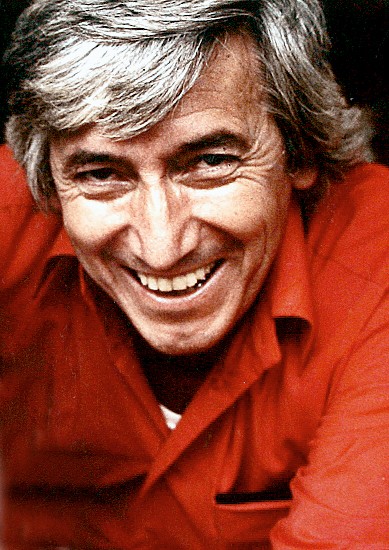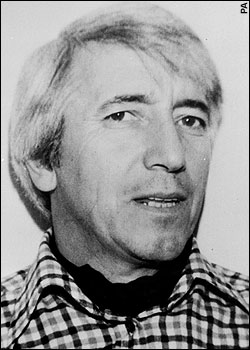<Back to Index>
- Mathematician John Pell, 1611
- Painter Francesco Ubertini, il Bacchiacca, 1494
- Bulgarian Dissident Writer Georgi Ivanov Markov, 1929
PAGE SPONSOR


Georgi Ivanov Markov (Bulgarian: Георги Иванов Марков) (1 March 1929 – 11 September 1978) was a Bulgarian dissident writer.
Markov originally worked as a novelist and playwright, but during 1969 he defected from Bulgaria, then a Stalinist state governed by President Todor Zhivkov. After relocating to the West, he worked as a broadcaster and journalist for the BBC World Service, the US funded Radio Free Europe, and Germany's Deutsche Welle.
He criticised the Bulgarian Stalinist regime many times by radio. It is
speculated that, as a result of this, the Bulgarian government decided
to dispose of him, and asked the KGB for help. He was killed on a London street after a ricin containing pellet was fired into his leg, most likely by the Bulgarian secret police. Georgi Markov was born on 1 March 1929, in Knyazhevo, a Sofia neighbourhood. During 1946 he graduated from high school and began university studies in industrial chemistry. Initially Markov worked as a chemical engineer and a teacher in a technical school. At the age of 19 years old he became ill with tuberculosis which
forced him to attend various hospitals. His first literary attempts
occurred during that time. During 1957 he published “The Night of
Celsius”. Soon the novel “The Ajax Winners” (1959) and two collections
of short stories (1961) were published. During 1962 Markov published
the novel “Men” which won the annual award of the Union of Bulgarian
Writers and he was subsequently accepted as a member of the Union, a
prerequisite for a professional career in literature during the Stalinist times in Bulgaria.
Georgi Markov started working at the “Narodna Mladezh” publishing
house. The story collections “A Portrait of My Double” (1966) and “The
Women of Warsaw” (1968) secured his place as one of the most talented
young writers of Bulgaria. Markov also wrote a number of plays but most
of them were never staged or were removed from theatre repertoire by
the Communist censors: “To Crawl Under the Rainbow,” “The Elevator,”
“Assassination in the Cul-de-Sac,” “Stalinists,” and “I Was Him.” The
novel “The Roof” was halted in mid-printing since it described as a
fact and in allegorical terms the collapse of the roof of the steel
mill “Lenin.” Markov was one of the authors of the popular TV series
“On Every Milestone” which created the character of the Second World
War detective Velinsky and his nemesis the Resistance fighter Deyanov. During
that time and despite the ban of some of his works Georgi Markov was an
acclaimed author whom, among other writers and poets, Zhivkov tried
to co-opt and coerce into serving the regime with their works. During
that period Markov had a "bohemian" lifestyle which was unknown to most
Bulgarians. During 1969 Georgi Markov left for Bologna, Italy where
his brother lived. His initial idea was to wait until his reputation in
Bulgaria improved, but he gradually changed his mind and decided to
stay in the West, especially after September 1971 when the Bulgarian
government refused to extend his passport. Markov moved to London where he learned English and started working for the Bulgarian section of the BBC World Service (1972). He tried to work for the film industry, hoping for help from Peter Uvaliev, but was unsuccessful. Later he also worked with Deutsche Welle and Radio Free Europe.
During 1972 Markov’s membership in the Union of Bulgarian Writers was
suspended and he was sentenced in absentia to six years and six months
in prison for his defection. His
works were withdrawn from libraries and bookshops and his name was not
mentioned by the official Bulgarian media until 1989. The Bulgarian
Secret Service started Markov’s file under the code name “Wanderer.”
During 1974 his play “To Crawl Under the Rainbow” was staged in London,
while in Edinburgh the play “Archangel Michael,” written in English,
won first prize. The novel "The Right Honourable Chimpanzee,"
coauthored by David Phillips,
was published after his death. During 1975 Markov married Annabelle
Dilk. The couple have a daughter, Alexandra-Raina, born a year later.
Between 1975 and 1978 Markov worked on his “In Absentia Reports”
analysis of life in Communist Bulgaria. They were broadcast weekly on Radio Free Europe. Their criticism of the Communist government and personally of the Party leader Todor Zhivkov made Markov even more an enemy of the regime. In 1978, Markov was murdered, apparently by Communist agents. His grave is in a small churchyard at Whitchurch Canonicorum in Dorset. His “In Absentia Reports” were published in Bulgaria during 1990, after the end of the Communist government. During
2000, Markov was posthumously awarded the Order of Stara Planina,
Bulgaria's most prestigious honour, for his “significant contribution
to the Bulgarian literature, drama and non-fiction and for his
exceptional civic position and confrontation to the Communist regime.” Agents of the Bulgarian secret police, Darzhavna Sigurnost (Bulgarian: Държавна сигурност, abbreviated ДС), assisted by the KGB had previously made two failed attempts to kill Markov before a third attempt succeeded. On 7 September 1978 (the birthday of Todor Zhivkov), Markov walked across Waterloo Bridge spanning the River Thames, and was waiting at a bus stop on the other side, when he was jabbed in the calf by a man holding an umbrella.
The man apologized and walked away. Markov would later tell doctors
that the man had spoken with a foreign accent. The event is recalled as
the "Umbrella Murder" with the assassin claimed to be Francesco Gullino, codenamed "Piccadilly". Markov
recalled feeling a stinging pain from where he had been hit, he assumed
by the umbrella tip. When he arrived at work at the BBC World Service offices he noticed a small red pimple had
formed and the pain from being jabbed had not stopped. He told at least
one of his colleagues at the BBC about this incident. That evening he
developed a fever and
was admitted to a hospital where he died three days later, on 11
September 1978, at the age of 49. The cause of death was poisoning from
a ricin filled pellet. Due to the circumstances and statements Markov made to doctors expressing the suspicion that he had been poisoned, Scotland Yard ordered a thorough autopsy of
Markov's body. The forensic pathologists discovered a spherical metal
pellet the size of a pin-head embedded in Markov's calf. The pellet measured 1.52 mm in diameter and was composed of 90% platinum and 10% iridium. It had two holes with diameters of 0.35 mm drilled through it,
producing an X-shaped cavity. Further examination by experts from Porton Down showed that the pellet contained traces of toxic ricin.
A sugary substance coated the tiny holes creating a bubble which
trapped the ricin inside the cavities. The specially crafted coating
was designed to melt at 37° Celsius (the temperature of the human body).
As the pellet was shot into Markov, the coating melted and the ricin
was free to be absorbed into the bloodstream and kill him. Irrespective
of whether the doctors treating Markov had known that the poison was
ricin, the result would have been the same, because there is no
antidote to ricin. Ten days before the murder, an attempt was made to kill another Bulgarian defector Vladimir Kostov in the same manner as Markov, in a Paris metro station.
Doctors found the same kind of bullet in his skin. However, it seems
that the sugar coating of the bullet protecting the ricin content was
damaged during the shot or before, and thus, only a tiny portion of the
poison got into his blood, causing only fever. Kostov reported that the
shot came from a man carrying a small bag, but not an umbrella. The
main reason for this was the declaration of Markov who saw the umbrella
but never said he was shot by it. However, forensic experts declared
that the probable "gun" that shot the bullet was probably very
sophisticated, another reason to believe in state action. Several well-known KGB defectors, such as Oleg Kalugin and Oleg Gordievsky have confirmed that the KGB arranged the murder, even presenting the Bulgarian assassin with alternatives such as a poisonous jelly to smear on Markov's skin,
but to this day no one has been charged with Markov's murder, largely
because most documents relating to his death were probably destroyed.
The British newspaper The Times has reported that the prime suspect is an Italian named Francesco Gullino (or Giullino) who lives in Denmark. The story goes on to note that the Bulgarian statute of limitations ended in 2008. A British documentary, The Umbrella Assassin, interviewed
people associated with the case in Bulgaria, Britain and America, and
revealed that the prime suspect, Gullino, is alive and well, and still
traveling freely throughout Europe. There
were reports during June 2008 that Scotland Yard had renewed its
interest in the case. Detectives were sent to Bulgaria and requests
were made to interview relevant individuals. There also seems to be a newfound interest on the part of the Bulgarian authorities to resolve the case.